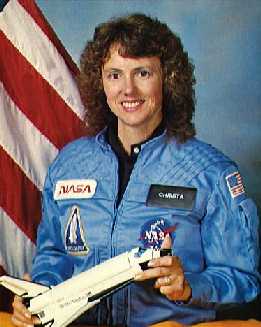| The River Reporter Space Shuttle Challenger crashes Spaceship disaster stuns area students By TOM RUE RIVER VALLEY -- The explosion Tuesday of the space shuttle Challenger, killing all seven crew-members -- including teacher Christa McAuliffe -- came as a shock to area school children and faculty members who were monitoring events as they took place. Several school teachers had tailored their lesson plans to include media coverage of the Challenger mission, and particularly McAuliffe's science lesson from space.In Narrowsburg, a satellite receiver disch had been brought in especially to monitor the live NASA broadcase of the launch from the Kennedy Space Center. Ninth grade science students, assembled in the school library, watched in disbelief as the television screen showed the craft blow up, leaving trails of smoke and scattering debris across the Atlantic. "I feel very bad about this, because I was directly involved with the satellite broadcase," said Narrowsburg science teacher Ronald Scheuren who had made the arrangements to monitor the NASA satellite broadcast. Over the several days prior to the launch, Scheuren said he experienced frustration with the weather conditions which not only delayed the shuttle's takeoff, but also created technical difficulties with reception and getting the dish to work properly. In Scheuren's ninth-grade science class during the last period of the day on Tuesday, students discussed some of their emotional reactions to what they had seen televised. Most seemed at a loss for words or gave one-word descriptions of how they felt. "Sick," said one girl. "Weird," said another. A boy in the front row said he was "surprised." He thought for a moment, then added, "I'm still just getting used to it. Space shuttles are going up all the time, and nothing like this ever happened before. I was more shocked than anything." Scheuren attempted to help the students sort out their feelings and put into perspective their internal experience in relation to the incident. "Life goes on," he said. "It's just like reproduction, like we talk about in biology. The individual dies, but the species lives on. Likewise, the [space] program will continue on, even after this terrible tragedy." In contrast to Narrowsburg Central Schol's coverage of the event, science classes at nearby Damascus School did not have access to the same high-tech equipment. Ralph Smith's fifth-grade science class listened in Damascus to CBS radio broadcases. According to Smith, the class heard news accounts of the mission's progress "until about a minute after takeoff." Then a commercial came on, and Smith switched the radio off, believing that everything from there on out would proceed typically, at least until Christa McAuliffe's first scheduled science lesson later in the week. About ten minutes later, Smith's class was interrupted by the schools secretary who had just received a phone call from a retired Damascus teacher telling about the explosion. The class's immediate response, Smith said, was disbelief. He saw "a lot of very long faces and blank looks." "At first," he related, "there wasn't much of a reaction. Then a couple hands went up and kids started asking questions." Some Damascus children might not have believed the reports they were hearing, said Smith, and laughed or joked about the idea of the mid-air explosion. This cynicism may be due to the effects of modern technology and violence on television. "With all the violence on TV, [some children] can't tell the difference between what they see on TV and what's really happening. They just don't see the reality of it," Smith stated, "I sort of put the responsiblity right on television itself." Asked whether he believed watching or hearing about the shuttle's explosion could have a traumatic effect on young children, Smith responded in the affirmative. "Yes, I think it would, seeking it live. Although, just hearing about it from someone, with the possibility of it being a rumor, some children might not take it as seriously as others. Despite this, Smith praised neighboring Narrowsburg School's efforts and presentation of the events on live televions. "That teacher was excellent. I wish we would have been able to do something like that." Smith added that he plans to show video-tapes of the huttle's take-off and explosion to his classes. Both Scheuren and Smith compared the emotional impact of the tragedy to the assasination of President Kennedy in 1963, and expressed the belief that modern school children would long remember what they were doing when they saw or heard about the Challenger's destruction. Both teachers expressed their own personal grief, as well as empathy for the families of the crew-members who were lost.
|
|

| Related Links About Christa McAuliffe N.A.S.A. website N.A.S.A. Challenger history |

© 1985-2005, Tom Rue. All rights reserved.
